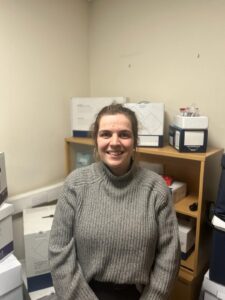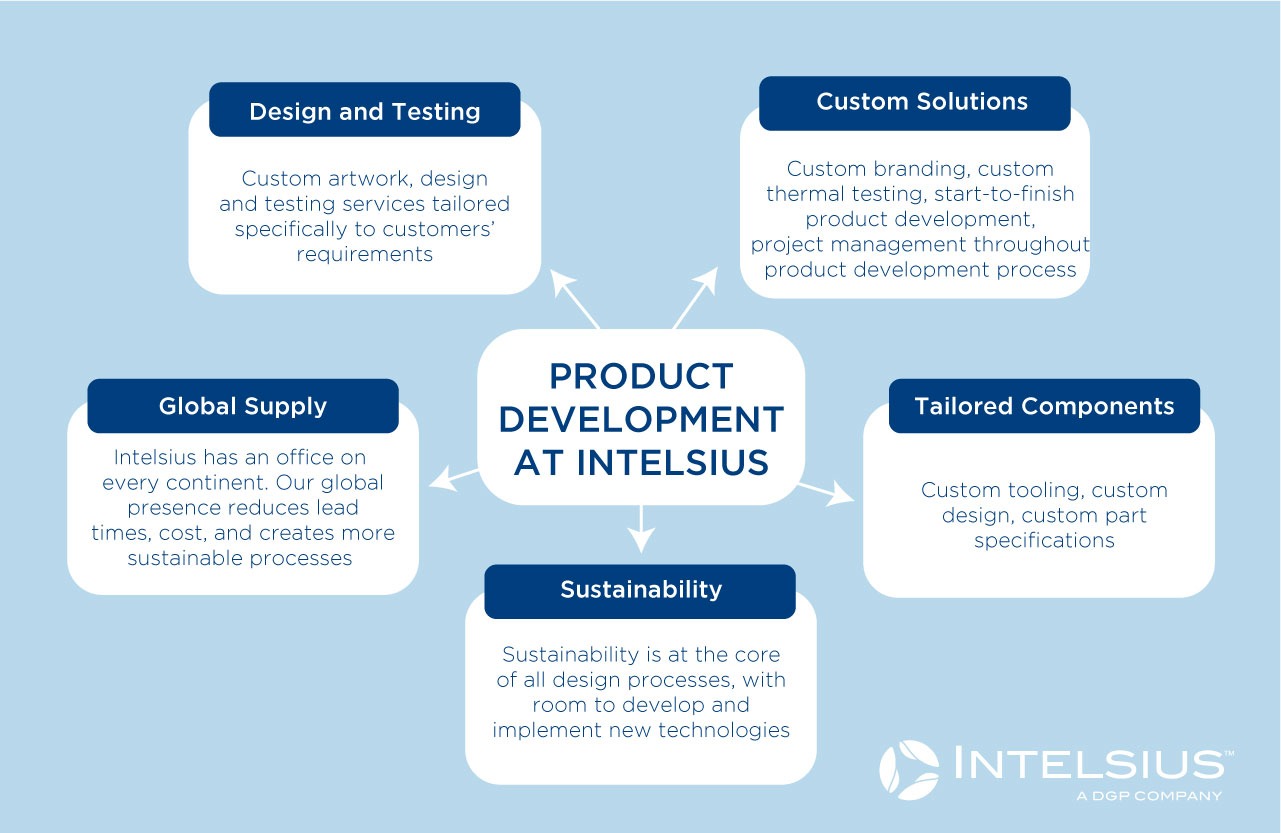Developing bespoke packaging solutions requires flexibility and adaptability. At Intelsius, we pride ourselves on offering customers a flexible and collaborative product development experience to ensure they receive a compliant, qualified, and durable packaging solution that meets their requirements and payload needs.
Our product development service offers customers full access to the expertise and project management skills of our Technical Services Team as well as access to our world-class International Safe Transit Authority (ISTA)-certified testing facilities. You can expect a fully customisable and flexible process that you personally approve at each stage of development.
stage of development.
In the following article, we speak with Lead Product Development Engineer Christiane Walker to discuss the process of developing a bespoke packaging solution at Intelsius.
What does the Technical Services Team do at Intelsius?
The Technical Services team are responsible for all the design and testing that goes into the product ranges offered at Intelsius. Customised product development can be in the form of a start-to-finish product or isolated design and/or testing services, which can include thermal, virtual and physical testing.
The process is specifically tailored to each customer’s requirements, depending on how much or little they would like to be involved in the finer details.
The scope of the development process can involve custom design development including pack-outs, custom components, custom artwork, or it could be custom testing processes alone. We offer custom drop testing, pack out testing or testing development services, and full project management services for developing a product from start to finish. Start-to-finish product development includes research, ideation all the way to final product delivery.
How does the product development process work?
The first step of the product development process would involve consulting with the customer to determine the product development brief and the details of what the customer needs in their solution. If something in our off-the-shelf product range can be adapted to fit those requirements, we will do so, either with additional testing or design work.
If a customer wants a custom-made solution, the first step is usually to ask for the product development details. We determine the full specifications of the solution they require, and then see if there is anything in our existing product range that can fit their requirements or can be adapted to fit the requirements. The process is very flexible, and customers can have as little or as much input as they would like.
During the product development brief stage, we usually nail down the key details of what the customer needs in terms of the performance of the packaging solution and its core design features. We determine the temperature profile, the duration of thermal protection required, what are the main features that the packaging must have; whether it needs to be easy-to-use, and other key fixed elements.
After the initial product development brief is determined, the Technical Services Team will begin the development process. Depending on the detail of the initial brief, this can involve different steps.
The process can be divided into three main areas:
- Custom design work
- Custom testing work
- Start-to-finish product development
What are the custom design services offered?
Design work at Intelsius involves a broad range of services that can involve as little or as much of the customer’s input as necessary. We use state-of-the-art software and technology to create design models, custom tooling and artwork.
Custom design work involves a spectrum of services, the most common of which is custom branding work, where we insert the customer’s logo and artwork into our existing solutions.
Intelsius also offers tailored component services in which a component is designed and tested to the required specifications.
Tailored components can fall into testing or design services. The process could take the form of simply slotting basic components into our existing packaging systems, or it could be a full custom development.
Customers can choose custom tooling, design and artwork. For tooling services, we create custom corrugate or plastic parts, computer-aided designs (CAD), renders, component testing and physical testing, along with iterative design.
What are the custom testing services offered?
Our ISTA-certified laboratory in York is equipped to carry out a range of tests to ensure all our packaging solutions have gone through adequate testing and are properly qualified. We carry out several tests, including:
- Analytical Thermal Modelling Software (ATMOS) testing
- Drop testing (UN3373 compliant packaging)
- Cold drop testing
- Wet drop testing
- Dry ice drop testing
Drop testing is when a package is intentionally dropped in controlled settings to test for durability and determine any weaknesses it may have, so that they can be rectified.
All testing processes yield a report that customers can use to validate the packaging system. We also offer customers an outsourced service where we send packaging systems for Category A testing, as well as ISTA 3A testing, at a separate facility.
Types of reports available from testing:
- Drop test report
- Full qualification report
- Indicative report
- ATMOS report
ATMOS testing allows us to create a digital twin of the packaging and test it against different thermal profiles with a relatively high degree of accuracy. This form of testing, which creates an all-virtual model, makes the process cost-effective and quick. Drop testing is also used for our UN3373 packaging, and we also offer drop test reports for packaging tested against the P650 packaging instructions.
We aim to test against as many potential situations as possible, for example drop testing is to test durability while wet drop testing is conducted to see how the packaging system will respond when soaked in water. These tests are conducted to ensure that the final packaging system is fit for purpose and can properly protect and preserve the payload within the right temperature range for the right duration, even after undergoing different levels of shock and potential damage to the outer packaging.
What is qualification, and why do we need to qualify packaging solutions?
Intelsius carries out rigorous qualification testing against international standards to ensure our solutions maintain the desired temperature, for the desired duration throughout its journey.
Our packages are tested against the ISTA 7D standard, which exposes the package and payload to extreme temperatures to determine the duration the internal packaging can maintain its desired payload temperature. The summer and winter temperature profiles mimic the temperatures seen in those seasons and are the most common type of testing profiles we conduct.
During the testing process, the minimum conditioned payload is packed into the system being tested, alongside its conditioned coolant pack out. The package and payload will then undergo external temperature challenges under ISTA 7D profiles within our environmental chambers.
The output of qualification testing is a comprehensive qualification report, including testing processes, results and full visibility of raw data for transparency and confidence in our testing processes.
Qualification testing allows customers to feel confident that the packaging solution they receive has been tested against internationally accepted standards. Adhering to testing standards minimises risks to product quality and payload temperature excursions while it is in transit, thereby providing customers with the peace of mind knowing that their payload will reach its destination with high-performance temperature control throughout.
Start-to-finish product development
Intelsius also offers a full spectrum of services to develop bespoke products from start to finish. This process would include research, ideation, design, and testing, from the time the final product is created to the end.
For a start-to-finish development, the first step again is to consult with the client and determine their exact requirements of a packaging system. Customers again have the choice to be as involved in the process as they would like and it can be a very collaborative process. The Technical Team will provide the scope of the development project as per customer specifications, and this brief would get signed off by the customer.
As part of the ideation process, we also conduct market research to determine what the current market needs are. We determine if there is a gap in the market or if there is an option for us and the customer to work on a collaborative patent on the packaging or even a possibility for joint ventures on patented products.
A non-exhaustive list of factors considered during the product development brief stage includes the following:
- Performance of packaging system
- Core design features (easy-to-use, size, weight, etc)
- Temperature profile
- Duration of performance
- Regulatory requirements
The Technical Team is equipped to carry out all refinement work, qualification work, pricing queries and stock ordering for the product. At every stage, the customer has input in the development process.
What about supply issues?
Common issues in the cold chain logistics industry have to do with lead times and inadequate supply. To mitigate this risk, Intelsius has built an international network of offices and distributors in key regions to serve customers no matter where they are located. Our products and services are available in the UK, Europe, Oceania, Asia, Africa and North and South America.
We currently have six manufacturing sites located in the UK, Germany, India, Malaysia, the US and Ireland.
We provide testing and development services for all Intelsius regions, however even if we are not in a customer’s region, we can specify packaging components for that region. All we need is a point of contact at the customer’s location, and we can organise shipping directly from our headquarters in York. As long as there is a specification and a line of communication, we can do the work for the customer.
Sustainability
Besides strengthening supply issues and reducing lead times, the advantage of having multiple offices and distributors in key locations means that sourcing components organising logistics becomes much simpler. A global manufacturing strategy also reduces lead times on supply delivery and is a more sustainable approach as delivery distances are reduced.
As sustainability is at the core of all we do at Intelsius, it is important to us that as an organisation, we develop packaging solutions that have the least negative impact on the environment as possible.
We recently launched our latest product, a 100% recyclable temperature-controlled single use packaging solution, GreenTherm. Manufactured using 70% recycled materials, we are investing into the circular economy by ensuring that this entire system is recyclable in a single recycling stream, thereby keeping them out of landfills. The system is qualified against ISTA 7D standards for up to 96+ hours at -20°C.
GreenTherm is one of the first fully recyclable solutions in the industry. If customers are looking to identify a new waste stream to work with for their packaging, we are equipped to develop and incorporate new technologies into the product development process. We make sure that innovation and forward-thinking solutions are at the forefront of all we do.
For further information on the Technical Services at Intelsius, click here. If you would like to meet the team behind Technical Services, click here.
Get in Touch
If you are looking to create a bespoke packaging system and would like to organise a consultation with the Technical Services Team, please reach out to cs@intelsius.com and someone will be happy to direct you to the right department.
